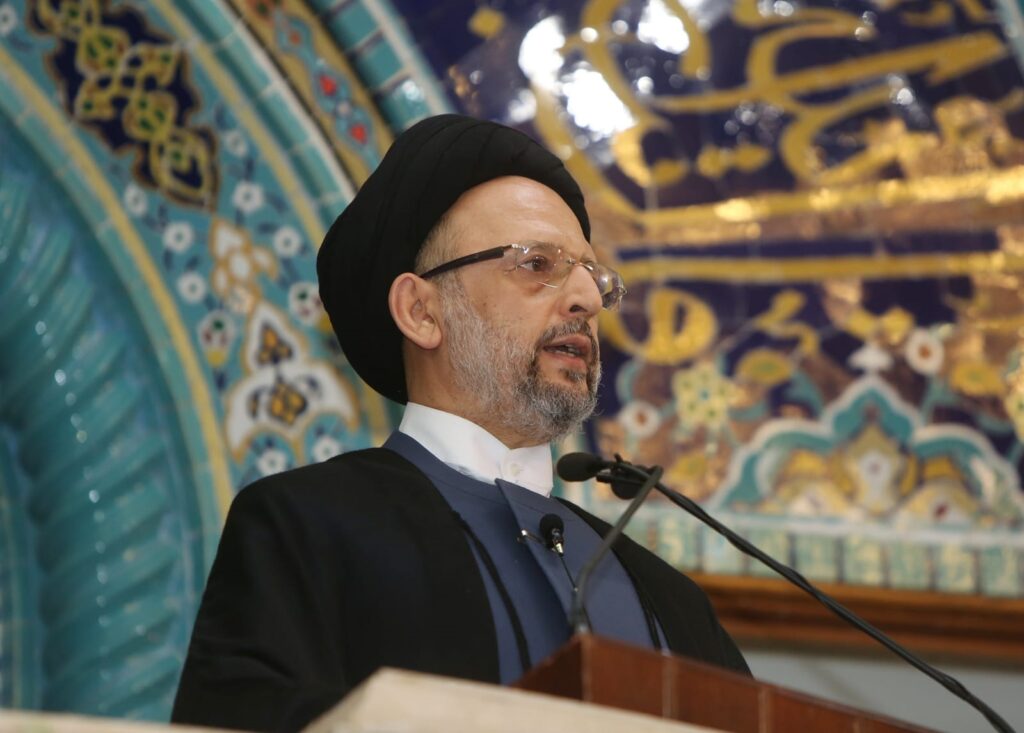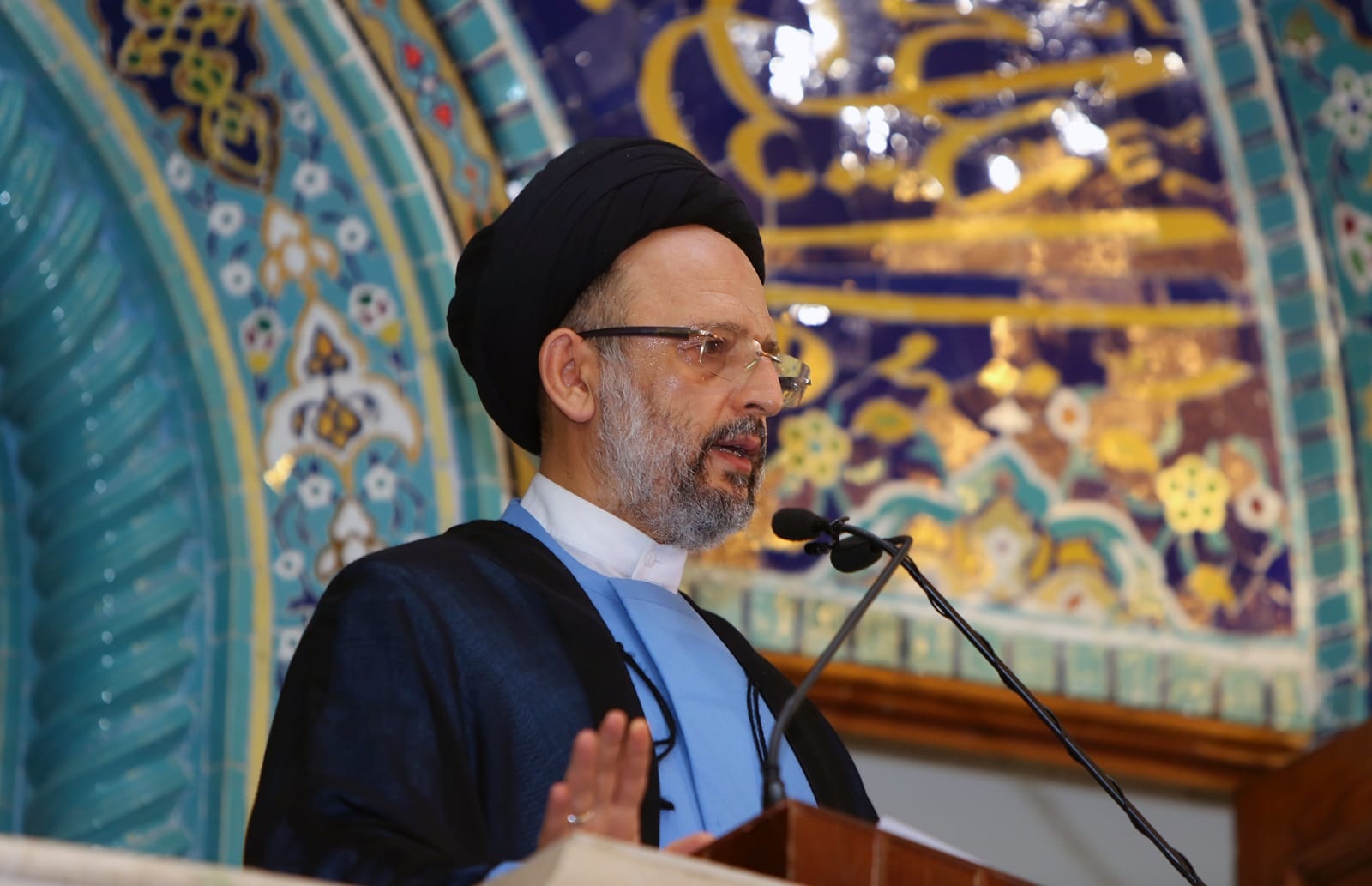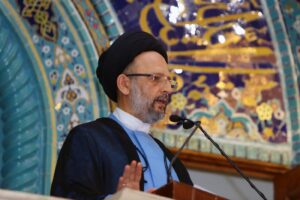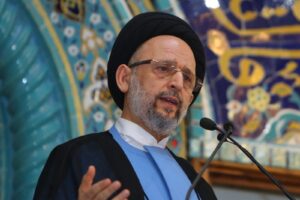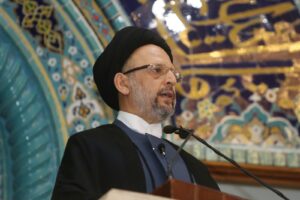In The Name of Allah, The Compassionate, The Merciful.
His Eminence, Sayyed Ali Fadlullah, delivered the two Friday prayer sermons at the Imamain Al-Hassanain Mosque, JamadaII 23. 1445 /January 5, 2024. Several prominent religious scholars, dignitaries, and hundreds of believers attended the Jumu’a prayer. Following is a summary of the sermons.
The First Sermon
Tasbihat Az-Zahra’
“Allah, the Most Exalted, says in His Glorious Book: “Indeed, Allah intends only to remove from you the impurity, O people of the [Prophet’s] household, and to purify you with [extensive] purification.” Allah speaks the truth.
On the twentieth of Jumada II, we celebrated the blessed birth of Lady Fatimah al-Zahra (a.s.), the mistress of the women of the worlds. This occasion represents an opportunity to draw inspiration from her life’s example, seeking guidance for our own lives, aspiring for greater purity and refinement.
She worshipped Allah to the extent that her feet would swell from the prolonged acts of worship. Her knowledge became a destination for those seeking it, drawn to her fountain of knowledge inherited from the Messenger of Allah (p.).
In her generosity, she embodied the verse: And they give food in spite of love for it to the needy, the orphan, and the captive, [saying], ‘We feed you only for the countenance of Allah. We wish not from you reward or gratitude.
She was the closest in character, guidance, and resemblance to the Messenger of Allah (p.).
In her role as a daughter, she reached a level where the Messenger of Allah, the Most Exalted, would say about her, “Fatimah is her father’s mother.” She set an example for every woman in her marital life, expressing this sentiment to Amir al-Mu’minin (a.s.) “You have never found me lying, unfaithful, or opposing…”
While Imam Ali said about her, “I used to look at her, and my worries and sorrows would disappear.”
She also fulfilled her role completely in raising and nurturing her children. Her upbringing bore Hassan and Hussein, the leaders of the youth of Paradise, exemplars of calling to Allah and sacrificing in His way. Zainab became the epitome of patience and steadfastness, the heroine of Karbala, while Umm Kulthum was a partner to her.
She actively participated in jihad, accompanying the Messenger(p.) in his battles to aid him, and to tend to the wounded. She taught the women among the Emigrants and the Ansar preserving the purity and clarity of Islam, standing against all that threatened it…
Today, we draw lessons from this commemoration, highlighting the supplication that the Messenger of Allah taught her, the supplication associated with her name: Ali (peace be upon him) felt compassion for Fatimah (a.s.) when he saw her weary due to her new responsibilities as a mother and the increased household duties. Unable to help her himself or afford a servant, he suggested going to her father, hoping he might assist with a servant. They went to the Prophet and Ali explained her situation. The Prophet could not fulfill their request as the money he had were dedicated to the poor people in Medina, but he did not want to leave them without aid. He advised them to engage in a supplication of glorification, praise, and exaltation of Allah a specified number of times.
This supplication is what became known as the Tasbih of Fatimah. Imam al-Sadiq (a.s.) emphasized its significance, stating, “Nothing a servant worships Allah with is better than the Tasbih of Fatimah. If there was something better, the Messenger of Allah would have taught it…”
Dear loved ones,
This guidance of the Messenger of Allah (p.) aimed firstly to reinforce in both women and men the sense of importance in fulfilling the roles and responsibilities within their households…
Secondly, the guidance of the Messenger of Allah aimed to emphasize the importance of frequent remembrance, as indicated in the abundant remembrance referred to in the noble verses: ‘O you who have believed, remember Allah with much remembrance’ and ‘And exalt Him morning and afternoon.’ Additionally, it was advised, ‘So when you have finished [your duties], then disperse in the land and seek [something] of the bounty of Allah, and remember Allah often that you may succeed.‘ A Hadith also stated, ‘Remember Allah abundantly in every hour of the night and day, for Allah, the Most Exalted, has commanded the abundance of remembrance.’ Another Hadith emphasized that every hour in which a person does not remember Allah would be a source of regret on the Day of Judgment.
This serves to underline the spiritual, educational, and faith-driven impact that these remembrances have on constructing the personality of a Muslim and reinforcing their relationship with Allah. The phrases within these remembrances—’Allahu Akbar’ (Allah is the Greatest), declaring Allah’s greatness above all else, and ‘Alhamdulillah’ (Praise be to Allah), acknowledging that all we have is from Him—remind all believers of their reliance and trust in Him, seeing Him as the ultimate source of all strength, provision, and guidance. As for glorifying God by saying ‘Subhana Allah,’ it is a declaration by humans of the perfection of God, that He is free from any deficiency, flaw, weakness, or imperfection. When one relies on Him, they are relying on a firm pillar that holds the keys to the heavens and the earth, unaffected by weakness, weariness, or sleep. This makes a person feel hope, reassurance, and confidence in Him
Thirdly, it is a signal for believers to seek refuge in these remembrances, particularly when feeling anxious, lonely, or despondent in the face of life’s challenges. Allah has promised tranquility to those who remember Him, saying, Verily, in the remembrance of Allah do hearts find rest.
On Lady Fatimah’s (a.s.) birth anniversary, we are in utmost need of drawing inspiration from her pure life and upbringing. Through this, we express our love, allegiance, dedication, and loyalty to her. She does not desire merely tears shed in her remembrance or celebrations held in her name. Instead, she wishes for us to embody her traits and follow her example in all her deeds, sacrifices, and patience—for these elevated her to a unique position before Allah, His Messenger (p.), and in the hearts of people… This prompted the poet Ahmed Shawqi to say:
He wished no offspring other than her,
And whoever begets al-Zahra, disregards all others.
The second sermon
I advise you and myself, O worshippers of Allah, with
the will of Al-Zahra (a.s) to her son, that Imam al-Hassan (a.s.), narrated: ‘I saw my mother Fatimah ,standing in her prayer niche on the night of Friday. She remained in prostration and bowing until the dawn broke, and I heard her supplicate for the believers, mentioning them by name … not asking for anything for herself. So I asked her: ‘O mother, why don’t you pray for yourself as you pray for others?’ She replied: ‘O my son, the neighbor comes first and then the home.’
Through her will, Al-Zahra sought to deepen within us the spirit of sacrifice and giving. She called upon us to care for people’s affairs, their needs, and their well-being. She emphasized that praying for those in need is one of the pathways to goodness due to its importance in fulfilling their needs. She encouraged us to prioritize them over ourselves.
By doing so, we remove selfishness from within and sow goodness wherever we are, becoming more capable of facing challenges.
We start from Lebanon, where the Zionist enemy persists in its aggressive practices on its villages and towns. These aggressions no longer stop at the borders of the border villages but have extended into the Southern Suburb of Beirut, which has not been targeted since 2006. This led to the assassination of Hamas Deputy Chief of the Political Bureau, Sheikh Saleh al-Arouri, and other Hamas leaders and members. This indicates a desire by this entity to escalate the conflict and shift it to the Lebanese interior. Although we still believe it fears that, since it knows its implications, given its previous experiences.
It has become clear that the enemy aims to achieve a certain victory on the Palestinian front, after failing to achieve a single major goal in Gaza, which it could present to its public. Although it attempted to disassociate itself from the assassination to avoid bearing its consequences, its fingerprints reveal its involvement, as mentioned by Zionist security and non-security leaders.
Facing this danger, we call for a unified Lebanese stance to confront this dangerous escalation. Silence will only embolden this enemy in its aggression, leading to further aggressions.
The Lebanese need to transcend their differences and divisions at this stage to prevent the enemy from entering this arena and benefiting from it, as it has done in previous times, by holding responsible those who initiated this battle, for this assassination and all previous ones, have demonstrated the enemy’s readiness to violate any country’s sovereignty under certain circumstances.
This aggression clearly demonstrates the enemy’s disregard for Lebanon’s sovereignty and the implementation of Resolution 1701, brushing it aside when its interests dictate that. It reaffirms that the obstacle is the enemy, which stands in the way of implementing this resolution or any international decisions. Lebanese people should comprehend this and convey it to envoys calling for Lebanon to enforce this resolution.
Lebanese people should be more aware of the risks posed by this entity, as Lebanon represents its existential opposite, after having endured the devastations caused by its invasions, wars, destruction, and its ambitions regarding land, water, and resources. If the enemy has failed to achieve its goals, it is not due to its compliance with international resolutions, but due to the steadfastness of the Lebanese people through their resistance, army, and unified stance against it.
In this country, we must work to fortify the internal front. This country cannot face storms or forthcoming challenges without earnestly working to speed up the achievements that ensure the Lebanese people’s steadfastness in political, economic, livelihood, and existential aspects.
It is regrettable that this country remains in a waiting state as it is now, seemingly incapable of managing its affairs and solving its problems by itself. It is high time for the political forces to take their roles and direct their efforts toward finding solutions. They are capable of finding such solutions if they unify their efforts, decide to move beyond their personal calculations, factional interests, and often-illusory gambles.
We return to the wounded Gaza, where the enemy continues its massacres, demolishing its infrastructure and all aspects of life, benefiting from international support and the time margin provided by the US administration, which only takes notice when Israeli soldiers fall, urging for a change in strategy in Gaza not out of concern for its people, but for the entity itself.
In this context, we warn against what is planned for Palestine, as the enemy’s objectives in Gaza have become clear by working on the displacement of its residents to the Sinai Desert or to remote corners of the world. The enemy explicitly declares this goal, which may not be limited to Gaza but could extend to anyone sympathizing with the resistance against the occupation in the West Bank and Jerusalem.
Given the events taking place, we renew the call to Arab and Islamic nations and all freedom-loving people to stand with the Palestinians and support their heroic stance against the enemy entity.
It is regrettable that South Africa is taking steps to file a lawsuit with the International Court of Justice to hold the enemy accountable for its crimes and practices, while no Arab or Islamic country has taken any initiative in this direction or participated in filing the lawsuit.
Finally, we must address the terrorist aggression that occurred in the city of Kerman during the ceremonies commemorating the fourth anniversary of the martyrdom of Qasem Soleimani, leading to the martyrdom and injury of hundreds who had gathered to participate in these ceremonies.
We extend our condolences to the Islamic Republic of Iran, its leadership, and its people, wishing mercy and elevation of status for the martyrs, healing for the wounded, and punishment for the criminals who committed this heinous attack and those who stand with them.
